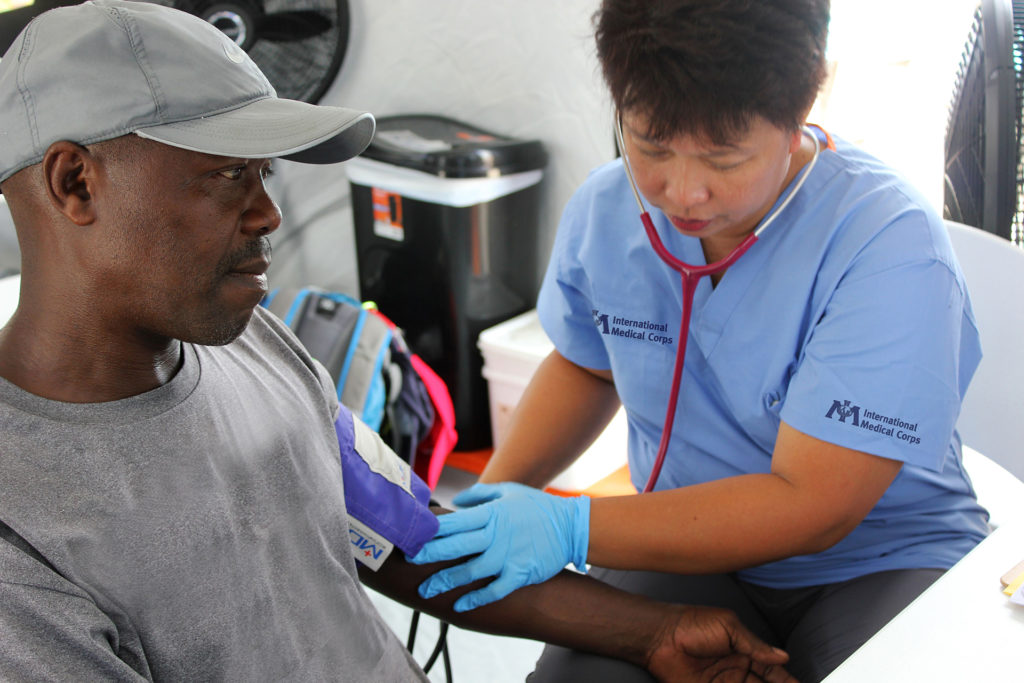
Bahamas
Hurricane Dorian slammed into the northwest Bahamas as a Category 5 hurricane in early September 2019. With sustained winds of 185 mph, gusts of up to 220 mph and storm surges as high as 23 feet, Dorian hit the Bahamas as the strongest hurricane ever recorded in the island nation’s history. More than 13,000 homes were destroyed, along with at least six health clinics. As recovery efforts continue months after the storm, the official death toll stands at 70, with hundreds still reported missing.
In response to the catastrophic damage that Dorian left in its wake in the Bahamas, International Medical Corps deployed an emergency response team consisting of doctors, nurses, logisticians, mental health and psychosocial support services (MHPSS) specialists, and water, sanitation and hygiene (WASH) specialists. The Bahamian government asked us to help lead assessment efforts and provide medical care throughout Grand Bahama island, particularly in eastern areas, which were the most affected by the storm and where the health system was decimated. Our team was the first to reach the most devastated communities, including High Rock, McLean’s Town and Pelican Point.
Today, International Medical Corps is continuing to work with the Bahamian government to provide basic medical services and supplies to those affected by the hurricane, as well as WASH and MHPSS services, through our “Hospitainer” primary healthcare mobile unit in East Grand Bahama.
The Challenges
Our Response
Primary Healthcare
International Medical Corps’ emergency response team, deployed immediately following the hurricane, consisted of doctors and nurses who went door to door in the hardest-hit parts of Grand Bahama island to provide direct medical care, fill gaps in prescription medicine and refer patients for specialized care. Today, as residents return to Grand Bahama island, we continue to provide medical support through a stationary clinic in High Rock, as well as a “Hospitainer” medical mobile clinic that serves hard-to-reach communities and individuals with disabilities in Freeport and East Grand Bahama. International Medical Corps also continues to support the Community Health Volunteers we have trained on health and hygiene promotion and on MHPSS.
Mental Health and Psychosocial Support Services (MHPSS)
The extended uncertainty surrounding the fate of those still unaccounted for, together with the island’s devastated infrastructure and social services, have combined to exacerbate MHPSS needs in Grand Bahama, especially for individuals with chronic and severe mental health conditions that require ongoing treatment and support. Our MHPSS team is working closely with the Bahamas Mental Health and Social Services staff to address these needs across Grand Bahama, by directly providing services and working closely with local mental health service agencies and providers to increase awareness and access to services. We are also continuing to provide training to health staff to build local MHPSS capacity.
Water, Sanitation and Hygiene (WASH)
Because the hurricane severely damaged the majority of municipal WASH services and infrastructure across Grand Bahama island, International Medical Corps’ WASH specialists are supporting efforts to prevent the spread of disease. We conduct daily surveys to evaluate the quality of water provided by the Grand Bahama Utility Company, and are working closely with local partners to ensure better water quality in the future. In the interim, with support from Rotary/Worldwaterworks Ltd., International Medical Corps distributed 140 Water Survival Kits, which include family filters and hygiene kits, in December 2019. As part of the distributions, International Medical Corps also conducted a training with eight Ministry of Health staff and 101 community members—including pregnant and lactating mothers and the elderly—on routine maintenance and operation of the kits.
Capacity-Building
International Medical Corps continues to build local capacity across the health, MHPSS and WASH sectors in Grand Bahama. We have trained 56 health staff on infection prevention and control measures, as well as on waste management. To address MHPSS needs, we have trained 68 social workers, doctor, nurses, police officers and community leaders on how to recognize common psychological and emotional responses to the hurricane, and how to provide positive coping mechanisms and psychological first aid.
We Were There: September 2019 Hurricane Dorian
Carrying winds of 75 mph and heavy localized rainfall, Hurricane Dorian developed into a dangerous Category 5 storm and slammed into the northwestern Bahamas, where it caused major damage.
Read more